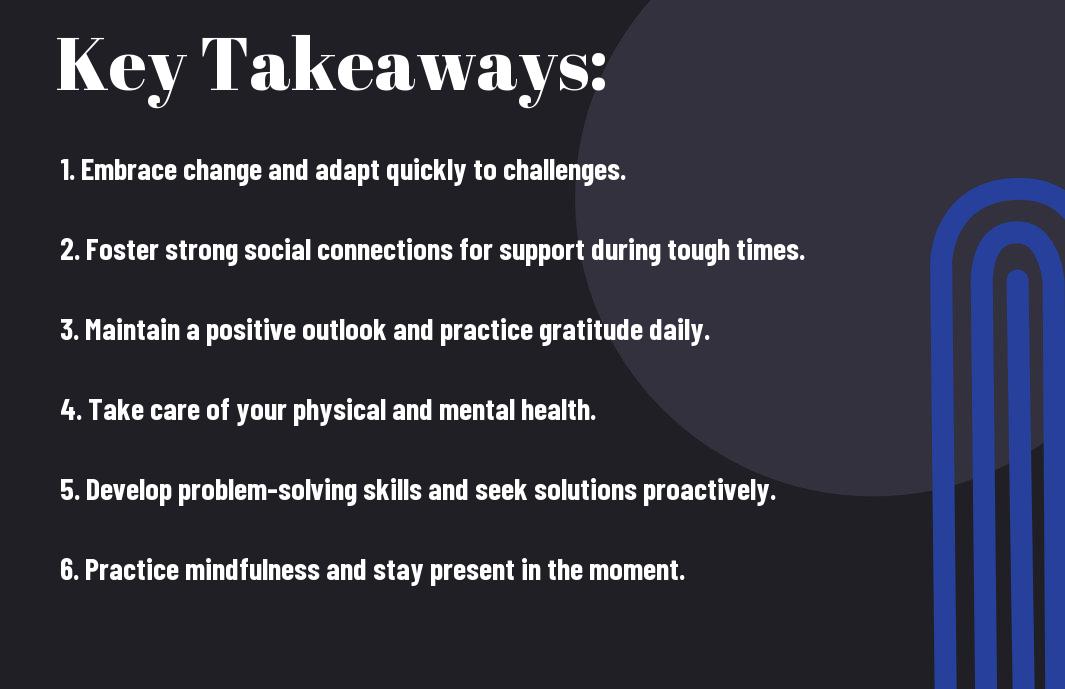What are the 7 keys to resilience?
Most individuals face challenges and setbacks at some point in their lives, and the ability to bounce back from adversity is crucial for overall well-being. Resilience is a fundamental trait that allows us to navigate through tough times with strength and grace. Understanding the keys to resilience can help us cultivate this vital quality within ourselves. Here are seven imperative factors that contribute to building and maintaining resilience in the face of life’s obstacles.
Key Takeaways:
- Self-awareness: Recognizing and understanding your emotions, thoughts, and reactions is crucial in developing resilience.
- Optimism: Maintaining a positive outlook and believing in your ability to overcome challenges is key to resilience.
- Healthy relationships: Building strong connections with others provides support and encouragement during tough times.
- Problem-solving skills: Developing effective coping strategies and problem-solving skills can help you navigate obstacles and setbacks.
- Physical well-being: Taking care of your physical health through exercise, proper nutrition, and sufficient rest contributes to resilience.

Self-Awareness
Recognizing Your Emotional Responses
Your emotional responses play a crucial role in developing resilience. By recognizing and understanding your emotions, you can effectively deal with challenges and bounce back from setbacks. It is imperative to identify your triggers, whether they are stress, fear, anger, or sadness, and learn how to manage them effectively. Self-awareness is the first step towards building resilience.
Identifying Your Strengths and Weaknesses
Your strengths and weaknesses define how you respond to adversity. Knowing what you excel at can boost your confidence and empower you to face challenges head-on. Similarly, acknowledging your weaknesses allows you to seek help where needed and develop strategies to overcome obstacles. Self-awareness gives you the insight to leverage your strengths and work on your weaknesses for personal growth.
It is imperative to conduct a self-assessment to identify your unique strengths and weaknesses. Pay attention to areas where you excel and areas that need improvement. Creating a list or journaling about your strengths and weaknesses can help you gain a clearer understanding of yourself.
Mindfulness
Staying Present in the Moment
Many experts believe that mindfulness is a key component of building resilience. Staying present in the moment allows individuals to fully experience their thoughts, feelings, and surroundings without judgment. By practicing mindfulness techniques such as deep breathing, meditation, or body scans, individuals can cultivate a heightened awareness of the present moment, which can help them manage stress and bounce back from challenges more effectively.
Developing a Mindful Approach to Challenges
Challenges are inevitable in life, but how we choose to approach them can greatly impact our resilience. By applying a mindful approach to challenges, individuals can cultivate a sense of curiosity, openness, and acceptance towards difficult situations. This involves acknowledging and experiencing emotions as they arise, without becoming overwhelmed by them. Mindfulness can help individuals approach challenges with a clear and calm mind, enabling them to make thoughtful decisions and take effective action towards overcoming obstacles.
A mindful approach to challenges involves being fully present and engaged in the moment, without getting caught up in past regrets or future anxieties. It allows individuals to tap into their inner resources and strengths, empowering them to face challenges with courage and resilience.
Self-Care
Prioritizing Physical Health
Prioritizing physical health is imperative for building resilience. Making time for regular exercise, getting an adequate amount of sleep, and eating a balanced diet are all key components of maintaining physical well-being. Exercise releases endorphins, which can help reduce stress and improve mood, while proper sleep and nutrition provide the energy needed to face life’s challenges head-on.
Embracing Positive Lifestyle Habits
The importance of embracing positive lifestyle habits cannot be overstated when it comes to resilience. Surrounding yourself with supportive relationships, engaging in hobbies that bring joy, and practising mindfulness and gratitude are all ways to foster a positive mindset. These habits can help you navigate difficult times with a sense of optimism and strength.
Plus, practising self-compassion and setting boundaries with work and social obligations are also crucial aspects of self-care. By acknowledging your own needs and limits, you can prevent burnout and maintain a healthy balance in your life. Recall, that taking care of yourself is not selfish; it is a necessary foundation for building resilience in the face of adversity.

Positive Relationships
Seeking Support from Others
Despite challenges and setbacks, we must recognize the importance of seeking support from others. It is crucial to cultivate strong relationships with friends, family, mentors, or support groups who can provide comfort, advice, and encouragement during difficult times.
Fostering Connection and Community
To build resilience, cultivating a sense of connection and community is imperative. Relationships play a significant role in our ability to navigate adversity and bounce back from life’s challenges. By fostering positive connections with others, we create a support system that can help us weather any storm.
This involves actively participating in social activities, volunteering, or joining groups that share similar interests or values. Connecting with others not only provides a sense of belonging but also offers opportunities for growth and learning from different perspectives.
Purposeful Goal Setting
Establishing Clear, Achievable Goals
After facing adversity, one of the keys to resilience is setting purposeful goals. By establishing clear and achievable goals, individuals give themselves a roadmap to follow during challenging times. These goals provide direction, motivation, and a sense of accomplishment as progress is made towards them.
Adapting and Persisting Through Setbacks
Persisting through setbacks is crucial in building resilience. As challenges arise, individuals must adapt their strategies and persist in their efforts towards their goals. This ability to bounce back from failure or setbacks is a key component of resilience and can lead to increased strength and growth in the face of adversity.
Adapting and persisting through setbacks involves maintaining a positive mindset, learning from failures, and trying new approaches when faced with obstacles. By staying flexible and resilient in the face of adversity, individuals can overcome setbacks and continue moving forward towards their goals.
Goals should be viewed as flexible and adjustable based on the situation. It is important to reassess and modify goals as needed to ensure they remain relevant and achievable. By staying focused on the ultimate objective while adapting to changing circumstances, individuals can better navigate through setbacks and challenges on the path to resilience.
Embracing Change
Developing Adaptability
Your ability to adapt to change is crucial for building resilience. Change is inevitable, and being able to adjust your mindset and approach in the face of unforeseen circumstances is a key skill to develop. By embracing change, you open yourself up to new possibilities and growth opportunities.
Learning from Experience
On your resilience journey, learning from past experiences is crucial. Reflecting on how you navigated challenges in the past can provide valuable insight into your coping mechanisms and help you identify areas for improvement. By understanding what has worked and what hasn’t, you can refine your resilience-building strategies and adapt more effectively to future setbacks.
Experience teaches us valuable lessons that we can apply to future situations. It is through facing adversity and learning from our mistakes that we grow and strengthen our resilience. By viewing challenges as opportunities for growth and learning, we can cultivate a more adaptive and resilient mindset.
Optimism
Cultivating a Hopeful Outlook
One of the key elements of resilience is the ability to cultivate a hopeful outlook, even in the face of challenges. By focusing on positive outcomes and maintaining a belief in the possibility of a better future, individuals can navigate through tough times with a sense of optimism and determination.
Balancing Realism and Positivity
Positivity is vital for resilience, but it is also important to balance it with realism. While maintaining a hopeful outlook, it is crucial to acknowledge the reality of the situation and be prepared for setbacks. By balancing optimism with a practical understanding of the challenges ahead, individuals can effectively navigate through adversity.
A hopeful outlook can provide the motivation and resilience needed to overcome obstacles, but it must be coupled with a realistic understanding of the situation. By maintaining a balance between optimism and realism, individuals can face challenges head-on while staying grounded in the present reality.
Conclusion
Presently, the 7 keys to resilience have been identified as self-awareness, optimism, adaptability, self-care, problem-solving skills, social support, and a sense of purpose. These factors play a significant role in helping individuals navigate through challenges, bounce back from adversity, and thrive in the face of obstacles. By nurturing these key characteristics, individuals can build their resilience and strengthen their ability to cope with life’s ups and downs. Incorporating these principles into daily practice can lead to a more resilient and empowered mindset, ultimately contributing to a more fulfilling and successful life.
FAQ
Q: What are the 7 keys to resilience?
A: The 7 keys to resilience are self-awareness, mindfulness, optimism, mental agility, strength, connection, and self-care.
Q: Why is self-awareness important for resilience?
A: Self-awareness is crucial for resilience because it allows individuals to understand their emotions, thoughts, and behaviours, which is crucial for effectively coping with challenges and setbacks.
Q: How does practising mindfulness enhance resilience?
A: Mindfulness helps individuals stay present and focused, reducing stress and increasing resilience by promoting a calm and clear mindset to face difficulties.
Q: What role does optimism play in building resilience?
A: Optimism enables individuals to maintain a positive outlook, see opportunities in difficulties, and believe in their ability to overcome challenges, which is a key component of resilience.
Q: Why is mental agility important for resilience?
A: Mental agility allows individuals to adapt to change, think creatively, and problem-solve effectively, all of which are crucial skills for building resilience in the face of adversity.